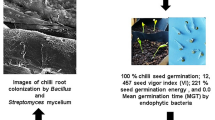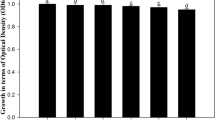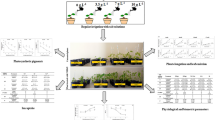Abstract
Using beneficial microorganisms has emerged as a potential new solution to induce resistance to biotic and abiotic stress tolerance in several plant species. BBS is a consortium of three plant growth-promoting rhizobacterium (PGPR) strains (Bacillus cereus AR156, B. subtilis SM21, and Serratia sp. XY21) we screened for soil-borne disease control and registered as a biofertilizer that was recently found to be resistant to the adverse environment. The present study examines the effect of BBS on chilling (4 °C) tolerance in tomato seedlings and its mechanism. After 7 days of chilling treatment and 1 week recovery at normal 28 °C, BBS-treated tomato plants had a survival rate of 92.59 %, on average six times more than control plants (15.56 %). Compared with the control, the BBS treatment stimulated faster and higher accumulations of MDA and H2O2 as chilling stress started, which initiated mechanisms to efficiently attenuate the chilling-induced injury. Besides, in relation to the control, the significantly higher transcription of CBF1 in BBS treatment may lead to stress-related gene induction. These findings suggested that BBS acclimated tomato seedlings and induced tolerance to chilling by promoting soluble sugar, proline, and osmotin accumulation, enhancing the antioxidant defense system, and stimulating CBF transcription factors to activate stress-related genes. This is the first time that PGPR-induced acclimation has been shown to protect tomato plants against low-temperature stress.






Similar content being viewed by others
References
Agnieszka KM, Pascal R, Tadeusz R (2008) The organ-dependent abundance of a Solanum lipid transfer protein is up-regulated upon osmotic constraints and associated with cold acclimation ability. J Exp Bot 59:2191–2203
Ait Barka E, Nowak J, Clément C (2006) Enhancement of chilling resistance of inoculated grapevine plantlets with a plant growth-promoting rhizobacterium, Burkholderia phytofirmans strain PsJN. Appl Environ Microbiol 72:7246–7252
Badawi GH, Yamauchi E, Shimada E, Sasaki R, Kawano N, Tanaka K, Tanaka K (2004) Enhanced tolerance to salt stress and water deficit by overexpressing superoxide dismutase in tobacco (Nicotiana tabacum) chloroplasts. Plant Sci 166:919–928
Beck EH, Heim R, Hansen J (2004) Plant resistance to cold stress: mechanisms and environmental signals triggering frost hardening and dehardening. J Biosci 29:449–459
Chen WP, Li PH (2002) Membrane stabilization by abscisic acid under cold aids proline in alleviating chilling injury in maize (Zea mays L.) cultured cells. Plant Cell Environ 25:955–962
Dimkpa C, Weinand T, Asch F (2009) Plant–rhizobacteria interactions alleviate abiotic stress conditions. Plant Cell Environ 32:1682–1694
Ding S, Huang CL, Sheng HM, Song CL, Li YB, An LZ (2011) Effect of inoculation with the endophyte Clavibacter sp. strain Enf12 on chilling tolerance in Chorispora bungeana. Physiol Plant 141:141–151
Dobrá J, Vanková R, Havlová M, Burman AJ, Libus J, Storchová H (2011) Tobacco leaves and roots differ in the expression of proline metabolism-related genes in the course of drought stress and subsequent recovery. J Plant Physiol 168:1588–1597
Fernandez O, Theocharis A, Bordiec S, Feil R, Jacquens L, Clément C, Fontaine F, Ait Barka E (2012a) Burkholderia phytofirmans PsJN acclimates grapevine to cold by modulating carbohydrate metabolism. Mol Plant Microbe Interact 25:496–504
Fernandez O, Vandesteene L, Feil R, Baillieul F, Lunn JE, Clément C (2012b) Trehalose metabolism is activated upon chilling in grapevine and might participate in Burkholderia phytofirmans induced chilling tolerance. Planta 236:355–369
Gill SS, Tuteja N (2010) Reactive oxygen species and antioxidant machinery in abiotic stress tolerance in crop plants. Plant Physiol Biochem 48:909–930
Gilmour SJ, Sebolt AM, Salazar MP, Everard JD, Thomashow MF (2000) Overexpression of the Arabidopsis CBF3 transcriptional activator mimics multiple biochemical changes associated with cold acclimation. Plant Physiol 124:1854–1865
Guo JH, Xue QY, Liu HX (2009) ‘Shu Dekang’ as a brand name. Trademark Office of The State Administration for Industry & Commerce of the People’s Republic of China. Patent application number 7823197
Harare ZS (2012) Black frost destroys citrus, horticulture. http://www.thezimbabwean.co/business/agriculture/50828/black-frost-destroys-citrus-horticulture.html. Accessed 11 Mar 2015
Islama F, Yasmeen T, Ali Q, Ali S, Arif MS, Hussain S, Rizvi H (2014) Influence of Pseudomonas aeruginosa as PGPR on oxidative stress tolerance in wheat under Zn stress. Ecotoxicol Environ Saf 104:285–293
Jaglo KR, Kleff S, Amundsen KL, Zhang X, Haake V, Zhang JZ, Deits T, Thomashow MF (2001) Components of the Arabidopsis C-repeat/dehydration-responsive element binding factor cold-response pathway are conserved in Brassica napus and other plant species. Plant Physiol 127:910–917
Janská A, Maršík P, Zelenková S, Ovesná J (2010) Cold stress and acclimation-what is important for metabolic adjustment? Plant Biol 12:395–405
Knight MR, Knight H (2012) Low-temperature perception leading to gene expression and cold tolerance in higher plants. New Phytol 195:737–751
Krasensky J, Jonak C (2012) Drought, salt, and temperature stress-induced metabolic rearrangements and regulatory networks. J Exp Bot 63:1593–1608
Li F, Wu QY, Sun YL, Wang LY, Yang XH, Meng QW (2010) Overexpression of chloroplastic monodehydroascorbate reductase enhanced tolerance to temperature and methyl viologen-mediated oxidative stresses. Physiol Plant 139:421–434
Liu H, Ouyang B, Zhang J, Wang T, Li H, Zhang Y, Yu C, Ye Z (2012) Differential modulation of photosynthesis, signaling, and transcriptional regulation between tolerant and sensitive tomato genotypes under cold stress. PLoS One 7:e50785
Lucas JA, García-Cristobal J, Bonilla A, Ramos B, Gutierrez-Manero J (2014) Beneficial rhizobacteria from rice rhizosphere confers high protection against biotic and abiotic stress inducing systemic resistance in rice seedlings. Plant Physiol Biochem 82:44–53
BBC News (2011) Cold snap hits Mexico maize crop. http://www.bbc.co.uk/news/world-latin-america-12437862. Accessed 11 Mar 2015
Niu DD, Liu HX, Jiang CH, Wang YP, Wang QY, Jin HL, Guo JH (2011) The plant growth-promoting rhizobacterium Bacillus cereus AR156 induces systemic resistance in Arabidopsis thaliana by simultaneously activating salicylate- and jasmonate/ethylene-dependent signaling pathways. Mol Plant Microbe Interact 24:533–542
Niu DD, Wang CJ, Guo YH, Jiang CH, Zhang WZ, Wang YP, Guo JH (2012) The plant growth-promoting rhizobacterium Bacillus cereus AR156 induces resistance in tomato with induction and priming of defence response. Biocontrol Sci Technol 22:991–1004
Patade VY, Khatri D, Kumari M, Grover A, Mohan Gupta S, Ahmed Z (2013) Cold tolerance in transgenic tomato (Solanum lycopersicum L.) is associated with modulation in transcript abundance of stress responsive genes. Springerplus 2:117
Patton AJ, Cunningham SM, Volenec JJ, Reicher ZJ (2007) Differences in freeze tolerance of zoysiagrasses: II. Carbohydrate and proline accumulation. Crop Sci 47:2170–2181
Pinhero RG, Rao MV, Paliyath G, Murr DP, Fletcher RA (1997) Changes in activities of antioxidant enzymes and their relationship to genetic and paclobutrazol-induced chilling tolerance of maize seedlings. Plant Physiol 114:695–704
Prasad TK, Anderson MD, Stewart CR (1994) Acclimation, hydrogen peroxide, and abscisic acid protect mitochondria against irreversible chilling injury in maize seedlings. Plant Physiol 105:619–627
Ruelland E, Vaultier MN, Zachowski A, Hurry V (2009) Cold signalling and cold acclimation in plants. Adv Bot Res 49:35–150
Sasaki K, Kim MH, Imai R (2007) Arabidopsis COLD SHOCK DOMAIN PROTEIN2 is a RNA chaperone that is regulated by cold and developmental signals. Biochem Biophys Res Commun 364:633–638
Shou HX, Bordallo P, Fan JB, Yeakley JM, Bibikova M, Sheen J, Wang K (2004) Expression of an active tobacco mitogen-activated protein kinase kinase kinase enhances freezing tolerance in transgenic maize. Proc Natl Acad Sci USA 101:3298–3303
Stevens R, Page D, Gouble B, Garchery C, Zamir D, Causse M (2008) Tomato fruit ascorbic acid content is linked with monodehydroascorbate reductase activity and tolerance to chilling stress. Plant Cell Environ 31:1086–1096
Stockinger EJ, Gilmour SJ, Thomashow MF (1997) Arabidopsis thaliana CBF1 encodes an AP2 domain-containing transcriptional activator that binds to the C-repeat/DRE, a cis-acting DNA regulatory element that stimulates transcription in response to low temperature and water deficit. Proc Natl Acad Sci USA 94:1035–1040
Su LT, Li JW, Liu DQ, Zhai Y, Zhang HJ, Li XW, Zhang QL, Wang Y, Wang QY (2014) A novel MYB transcription factor, GmMYBJ1, from soybean confers drought and cold tolerance in Arabidopsis thaliana. Gene 538:46–55
Theocharis A, Bordiec S, Fernandez O, Paquis S, Dhondt-Cordelier S, Baillieul F, Clément C, Ait Barka E (2012) Burkholderia phytofirmans PsJN primes Vitis vinifera L. and confers a better tolerance to low non-freezing temperatures. Mol Plant Microbe Interact 25:241–249
Thomashow MF (2010) Molecular basis of plant cold acclimation: Insights gained from studying the CBF cold response pathway. Plant Physiol 154:571–577
Venema JH, Linger P, van Heusden AW, van Hasselt PR, Bruggemann W (2005) The inheritance of chilling tolerance in tomato (Lycopersicon spp.). Plant Biol 7:118–130
Wang WJ, Chen YZ, Liu MQ, Lu CF (2008) Effects of cold hardening on compatible solutes and antioxidant enzyme activities related to freezing tolerance in Ammopiptanthus mongolicus seedlings. For Stud China 10:101–106
Wang CJ, Yang W, Wang C, Gu C, Niu DD, Liu HX, Wang YP, Guo JH (2012) Induction of drought tolerance in cucumber plants by a consortium of three plant growth-promoting rhizobacterium strains. PLoS One 7:e52565
Yang J, Kloepper JW, Ryu CM (2009) Rhizosphere bacteria help plants tolerate abiotic stress. Trends Plant Sci 14:1–4
Zhang X, Fowler SG, Cheng H, Lou Y, Rhee SY, Stockinger EJ, Thomashow MF (2004) Freezing-sensitive tomato has a functional CBF cold response pathway, but a CBF regulon that differs from that of freezing-tolerant Arabidopsis. Plant J 39:905–919
Zhang W, Zhuang Z, Zheng L, Wang Y, Guo JH (2010) Effects of biopesticide against root-knot nematodes in bitter melon. China: plant bacteria disease and biocontrol. 365
Zheng Y, Liu HX, Guo JH (2011) Effects of biopesticide ‘SHUDEKANG’ against banana wilt. Jiangsu Agri Sci 39(2):199–201
Zhuang ZG, Zheng L, Zhang WZ, Li SM, Guo JH (2010) Effects of biopesticide‘SHUDEKANG’ against root-knot nematodes in cucumber under field conditions in Huai’an city. China: plant bacteria disease and biocontrol. 372–377
Acknowledgments
This work was supported by the National Natural Science Foundation of China (31171809) and the Natural Science Foundation of Jiangsu Province (BK20131319).
Author information
Authors and Affiliations
Corresponding author
Electronic Supplementary Material
Below is the link to the electronic supplementary material.
Rights and permissions
About this article
Cite this article
Wang, C., Wang, C., Gao, YL. et al. A Consortium of Three Plant Growth-Promoting Rhizobacterium Strains Acclimates Lycopersicon esculentum and Confers a Better Tolerance to Chilling Stress. J Plant Growth Regul 35, 54–64 (2016). https://doi.org/10.1007/s00344-015-9506-9
Received:
Accepted:
Published:
Issue Date:
DOI: https://doi.org/10.1007/s00344-015-9506-9




